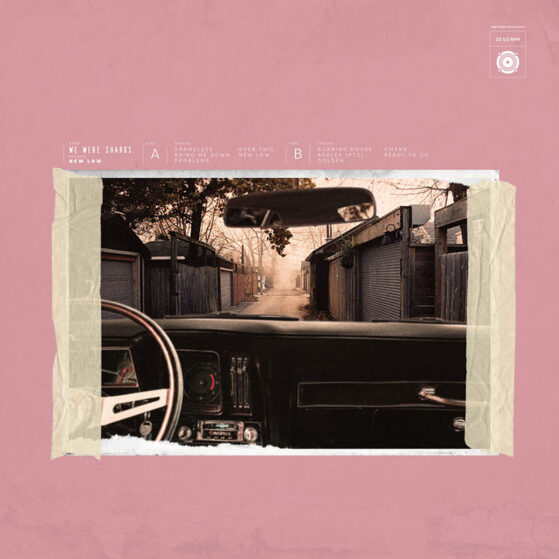WE WERE SHARKS
We Were Sharks’ flippancy is a breath of fresh air in the face of a pop punk scene that’s very self-serious (and seriously lacking self). While many of their peers wax poetic about wearing their hearts on their sleeves, this Ottawa band wears their wit in their moniker; they literally were a band called Sharks until legalities threatened to stop the party.
But the party didn’t stop, as the band cheekily updated their name and carried on, and it continues on their forthcoming sophomore LP. Irreverence inspires the lyrics, more a means to an end than some meaningful and profound proclamation that would position We Were Sharks as pop punk philosophers.
No, the album starts with the big “fuck you” of “Shameless,” which holds a mirror up to a self-important generation, before “Over This” holds one up to that song. Inspired by co-writer (and Silverstein guitarist) Paul Marc Rousseau’s in-studio admission he was in Europe but hated his life, the song touches on presenting as happy when you’re anything but. Who’s being real, and who’s fooling whom?
The band’s ability to turn a simple statement into a bona fide song without the need for lived experience is their ace in the hole, allowing them to produce meaningful songs from next to nothing. Typical relationship drama is exactly that on “Burning House” and “Problems,” while “Ashley (Pt 2)” flips the fictional romance started on 2018’s Lost Touch (Victory) on its head.
“The original ‘Ashley’ was a fun, fast song we’d had kicking around for years, but we hesitated to put it out because putting out a 70-second song is a death sentence” explains guitarist Colin Jacques, nothing you risk being pigeonholed as unable to write anything more. “We did that one for us.”
The musicians were empowered by the fact that their selfish serving of punk rock connected with fans, encouraging further exploration. “Shameless” is a bit longer than “Ashley (Pt 2)” (itself a bit longer than its prequel) but is similarly driving a la fellow Canadians Gob. Its follow-up, “Bring Me Down,” keeps its feel north of the border like Treble Charger, a band more pop punk due to the era than their rocking bedrock and ambitions.
That’s the focus this time around. Sure, they’re still based in pop punk, and they aren’t too cool to admit it, but they reach beyond. Songs like “Golden” and “Omens” utilize the modern pop songwriting formula wherein the pre-chorus is bigger than its successor. This nuanced approach came from the layered writing process. Whereas past endeavours found five guys butting heads over five different perspectives of childhood favourites, this time new bassist Matthew Sears served as de facto in-band producer. They co-wrote with Rousseau—another finessing filter—before Sam Guaiana produced.
“We can’t imagine doing a record without those two,” explains other guitarist Jason Mooney. “They’re the glue that holds our sound together. Writing with Paul Marc brought out some unique elements most musicians wouldn’t pull out, challenging us, which Sam pushed further as producer. They’re also both incredibly handsome and have managed to not age; we’re hoping that’ll help us achieve a timeless record.”
By swinging to both sides of pop punk, both the pop and rock edges, the band expanded their sound while their band shrunk from three guitars to two. It’s the kind of thing that will make the van a little roomier when touring returns. Similar to their sonic gains made since the release of Lost Touch, We Were Sharks were growing their draw with their first proper US experiences. That included a slot at punk rock mainstay The Fest and tours alongside fellow pop punk satellite acts like Assuming We Survive, Boys of Fall and Never Loved.
Not like the added space would be a huge worry. With their next album, We Were Sharks are ready to reach a new high — and that could include a Bandwagon, or even bus. The only thing holding them back is the reality of the world they’re rearing to take over.
